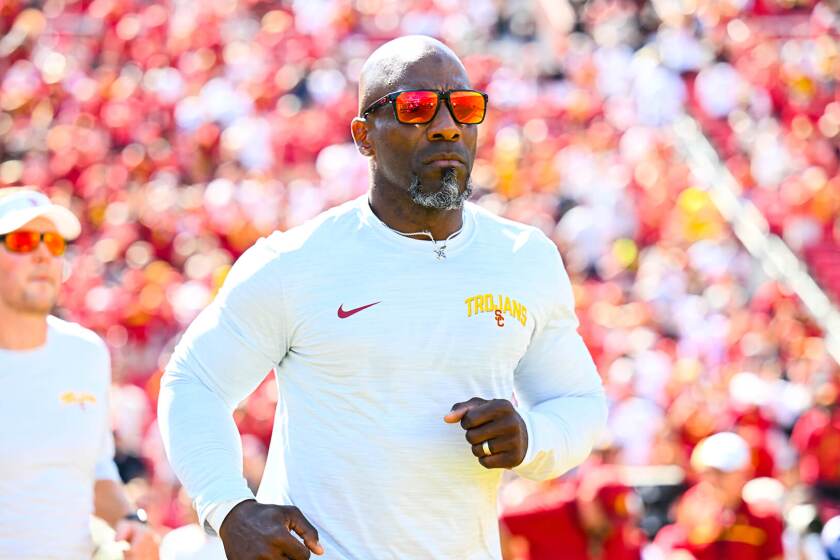Home-field advantage
- Share via
So the University of Southern California might move its football team to the Rose Bowl -- for every home game, not just the ones it usually plays there on the first day of each year. Let’s leave aside the emotional issues, like how Trojans would feel about driving to Pasadena for the game instead of walking from the campus to the Exposition Park Rose Garden, past the museums and to the Los Angeles Memorial Coliseum; or whether Bruins could find it in their hearts to share their adopted stadium with their crosstown rivals.
Let’s look instead at what brought us to this point. USC is playing hardball, negotiating for the best possible terms for continuing to play at the Coliseum, where it is the only stable tenant. Across the table is the Coliseum Commission, an unworkable board with representatives from the city, the county and the state who, it often seems, joined forces to assure that the historic 1923 Coliseum is an attractive venue for virtually no one.
The pols who control the commission have spent so much effort trying to bring a National Football League team to the Coliseum that they have alienated USC, which, because of its location and history, is tied to the stadium and best positioned to guide it to better days. Letting the university take control would be in the best interests not just of its administrators and the Exposition Park neighborhood but all three governmental entities that have an ownership stake in the Coliseum -- and all residents of L.A. who deserve a world-class sports and entertainment complex.
The Times has long promoted the Coliseum as the best place for an NFL team. Still, we have to hand it to Mayor Antonio Villaraigosa for recognizing the truth: The NFL and the stadium broke up long ago and aren’t getting back together. At least, not as long as the commission acts as a marriage broker.
USC, of course, wants everything: the ability to run the Coliseum for the next four decades, lucrative naming rights, power to bring much-needed seating, lighting and facility improvements. And it wants it for a very long time. Would USC be able to demolish part of the stadium or to alter the look and feel of the historic structure with renovations? The commission would be wise to ask these questions -- and to recognize that the Coliseum represents a substantial public investment as well as a historically significant structure. That’s a lot to hand over to a private university. Still, the commission has bungled its way into this situation; USC could hardly do worse. It could well prove to be a better guardian of the Coliseum.
More to Read
Go beyond the scoreboard
Get the latest on L.A.'s teams in the daily Sports Report newsletter.
You may occasionally receive promotional content from the Los Angeles Times.






